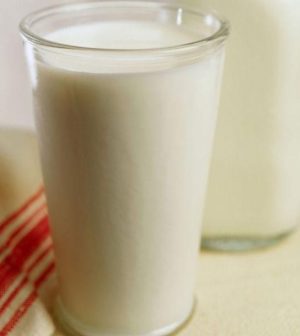- 10 Strategies to Overcome Insomnia
- Could Artificial Sweeteners Be Aging the Brain Faster?
- Techniques for Soothing Your Nervous System
- Does the Water in Your House Smell Funny? Here’s Why
- Can a Daily Dose of Apple Cider Vinegar Actually Aid Weight Loss?
- 6 Health Beverages That Can Actually Spike Your Blood Sugar
- Treatment Options for Social Anxiety Disorder
- Understanding the Connection Between Anxiety and Depression
- How Daily Prunes Can Influence Cholesterol and Inflammation
- When to Take B12 for Better Absorption and Energy
Want Fewer Fractures in Nursing Homes? Put More Dairy on the Menu

Serving more dairy products to nursing home residents could be a simple way to reduce their risk of falls and fractures, a new study suggests.
Many consume low levels of calcium and protein, which can result in weak bones that increase the likelihood of falls and fractures. Dairy products such as milk, yogurt and cheese are high in calcium and protein.
This two-year study included 60 nursing homes in Australia with 7,195 residents who consumed less than the daily recommended levels of 1,300 milligrams (mg) calcium and 1 gram of protein from food sources for every kilogram of body weight.
Residents’ average age was 86, and 72% were women.
A control group of 30 continued their usual menus, which provided 700 mg/day of calcium and 0.9 g protein/kg body weight/day (control group). Thirty others (intervention group) provided more milk, yogurt and cheese to increase residents’ daily intake to 1,142 mg calcium and 1.1 g protein/kg body weight.
Overall, there were 324 fractures (135 of the hip), 4,302 falls, and 1,974 deaths during the study at the 27 intervention homes and 29 control homes that provided data.
Increased dairy consumption in the intervention homes was associated with a 33% lower risk of all fractures; a 46% lower risk of hip fractures; and an 11% lower risk of falls. Risk of death remained unchanged.
The reduced risk of fractures associated with increased dairy consumption was similar to that seen in clinical trials testing drug therapy to increase bone strength in people with osteoporosis, according to authors of the study published Oct. 20 in the BMJ medical journal. Nutritionist Sandra Iuliano, of the University of Melbourne in Australia, led the study.
Using dairy products to improve intake of calcium and protein “is a readily accessible intervention that reduces risk of falls and fractures commonly occurring in institutionalized older adults,” the researchers wrote.
This approach “has widespread implications as a public health measure for fracture prevention in the aged care setting and potentially in the wider community,” they concluded.
More information
The U.S. National Institute on Aging has more on preventing falls and fractures.
SOURCE: BMJ, news release, Oct. 20, 2021
Source: HealthDay
Copyright © 2026 HealthDay. All rights reserved.










